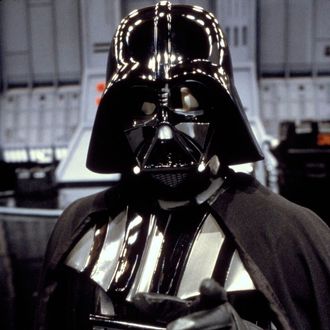
Update: It’s now official. Michael Arndt will write the screenplay for Star Wars: Episode VII. The official Star Wars site says the following: “As pre-production of Star Wars: Episode VII begins, Lucasfilm has confirmed that award-winning writer Michael Arndt will write the screenplay for the new Star Wars film. As revealed in the ongoing video series posted here on StarWars.com, Kathleen Kennedy and George Lucas have begun story conferences with Arndt.”
Informed sources tell Vulture that Star Wars: Episode VII has found a leading candidate to write the film’s screenplay: Michael Arndt, the Pixar favorite who was nominated for an Oscar for Toy Story 3, won an Oscar for Little Miss Sunshine, and wrote The Hunger Games: Catching Fire, which is currently shooting. Insiders confirm that Arndt has written a 40- to 50-page treatment for the film and is likely to be at least one of the writers when the Disney/Lucasfilm project begins shooting in 2014.
The merger between George Lucas’s brainchild and Disney, announced October 30, caught the town by surprise. And talent agents were similarly astonished to learn that Arndt had been at work on the treatment long before the deal was announced, catching them flat-footed and cutting off any chance they’d have to proffer their own many eager candidates for the coveted job.
Sources also tell Vulture that the studio’s brass want to bring back the three central characters of the original Star Wars: a much older Luke Skywalker, Princess Leia, and Han Solo. No deals are in place with any of the original actors, though our source did say it had high ambitions to sign up Mark Hamill, and EW recently reported that Harrison Ford was open to the idea of returning. We’re told that Arndt’s 40-something page treatment will soon be crossing the desks of top directors, including Brad Bird, Steven Spielberg (the former producing partner of Lucasfilm co-chair Kathleen Kennedy), and J.J. Abrams. Whether they’d be interested is unknown (Star Wars is a lot of baggage for an established director), but Disney wants to make sure they’ve at least tried the biggest names.
A representative for Arndt declined to comment, referring all calls to Kennedy, who did not return a call seeking comment at deadline. A Lucasfilm spokeswoman declined to comment, saying, “We have no news to report at this time.”
The choice of Arndt to pen a treatment makes perfect sense, given both his prestige as a screenwriter and his close relationship with Disney’s equally secretive Pixar — he’s the screenwriter of the cheekily titled Untitled Pixar Movie That Takes You Inside the Mind for Up director Pete Docter, currently in preproduction — but there’s one more reason still that Arndt would be so appealing to Disney and Lucasfilm: He’s a Star Wars expert.
Since winning the Oscar for Sunshine, Arndt has lectured extensively on the art of storytelling at numerous writers’ retreats, like the Hawaii Writers Conference in Maui and the Austin Film Festival, always featuring a lengthy and detailed explanation of why the original Star Wars’ ending is so creatively satisfying.
At these talks, Arndt always tells attendees that Star Wars’ enduring appeal has to do with resolving its protagonists goals’ nearly simultaneously, at the climax of the movie. In the comments section of a discussion about a Star Wars talk Arndt gave at the Austin Film Festival in 2010, one attendee of the seminar notes, “Arndt stated that if a writer could resolve the story’s arcs (internal, external, philosophical) immediately after the Moment of Despair at the climax, he or she would deliver the Insanely Great Ending and put the audience in a euphoric state. The faster it could happen, the better. By [Arndt’s] reckoning, George Lucas hit those three marks at the climax of Star Wars within a space of 22 seconds.”
Indeed, in the third act of Star Wars, as Arndt explained to his young screenwriting Padawans at the 2009 Hawaii Writers Conference, its central characters’ main goals all are met on pages 89 through 91 of the original Lucas script: At the crescendo of Star Wars, a spectral Obi Wan urges, “Use the Force, Luke,” and he does, thus reaching his inner goal (fighting self-doubt to become a hero). Han Solo reappears (meeting the philosophical goal of overcoming selfishness with altruism) to shoot down Darth Vader, which allows Luke to use the Force to mentally guide his shot and blow up the Death Star (outer goal and inner goals simultaneously met).
So while it remains to be seen whether Arndt will forge ahead with an entire script for Episode VII, clearly, as Vader might say, “The Force is strong with this one.”




